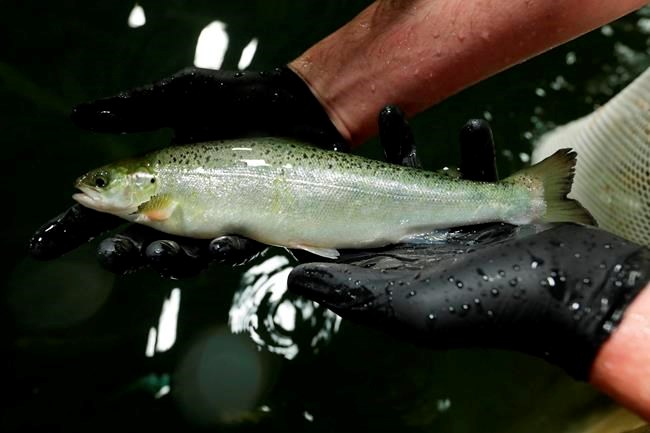A company that pioneered genetically modified salmon in Canada has stopped production at its Prince Edward Island facility of adult fish for sale, prompting celebrations from industry critics.
AquaBounty said in a release today that with most of its production now focused on the United States market, it will instead use its P.E.I. facility to produce eggs and broodstock — adult fish used for breeding.
The U.S.-based company says it will expand production in P.E.I. of conventional salmon eggs to be sold into the North American market, adding that it will still produce transgenic eggs on the Island for its facility in Indiana.
Sharon Labchuk, a spokeswoman for the GMO Free P.E.I. coalition, calls the news a "victory," as various group have vigorously petitioned grocers not to sell the genetically modified fish.
In 2021, conservation charity Nature Canada and Quebec-based Vigilance OGM launched a campaign offering a $500 reward for any information about the first salmon sold from the facility in Rollo Bay, P.E.I.
Nature Canada spokesman Mark Butler says he is pleased by the announcement, saying it reduces one of the many threats to endangered, wild Atlantic salmon in Atlantic Canada and New England.
Conservation groups have been critical of Ottawa for not requiring the company to label the salmon as genetically modified, arguing that the fish or eggs may one day escape during transport and pose risks to unmodified salmon stocks.
However, the company says in its release that transgenic salmon eggs produced for its farms in the United States are female and sterile, adding that there are multiple physical barriers to prevent escape.
"In addition, rigorous testing is done to ensure non-transgenic eggs are produced and verified separately," the company said.
The Rollo Bay facility was completed in 2019 and received financing from the P.E.I. government, the Atlantic Canada Opportunities Agency and the federal Fisheries Department. The company said in 2021 that it had been selling the fish grown at the Island facility.
Mary Boyd of the MacKillop Centre for Social Justice in P.E.I. says the provincial and federal governments shouldn't have subsidized the company, calling that decision a "risky use of taxpayers' money.”
This report by The Canadian Press was first published Feb. 7, 2023.
The Canadian Press



